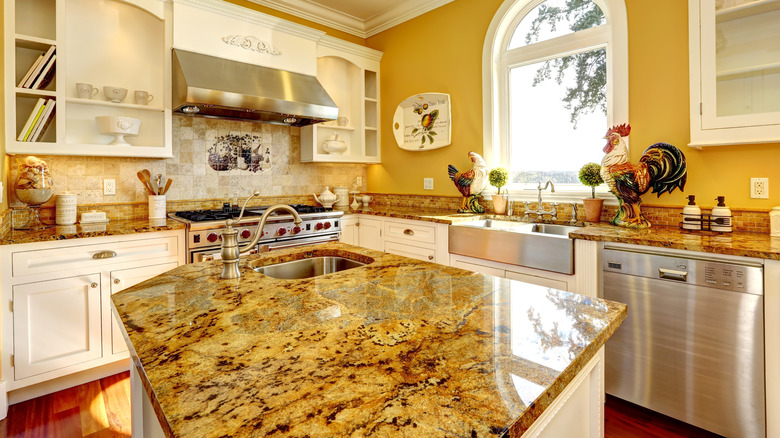What Is Stoneguard And Can It Protect Your Granite Countertops?
For most people, the soul of a home is the kitchen, and to keep it looking good and running smoothly, we want to care for it properly. Despite our different budgets and decor preferences, most of us agree that stone surfaces — marble, limestone, or granite countertops, in particular — are stunning. But because they're natural, they do need extra care. One of the primary caretaking activities for stone countertops is the need to reseal them fairly frequently. Stoneguard is the brand name of a different type of sealer, one made from thin sheets of polyethylene film rather than a liquid, and it does a fine job of sealing granite against spills.
Aside from its beauty, granite is a great choice for a countertop because of its high durability. Although using a cutting board is always preferable, sealed granite resists scratches from knives. But aside from its excellent overall durability, like other natural stones, granite's weakness is that it's porous, and its porosity makes it vulnerable to spills and liquids. Unsealed granite can also allow bacteria, mold, and germs can seep in. This is why sealing — and periodically resealing — is crucial.
There are many different types of granite sealants. They tend to be solvent-based, high-gloss, expensive, and contain a high level of VOCs (volatile organic compounds). But these sealers do their jobs exceptionally well, protecting porous stones and repelling liquids. When using these traditional products, granite should be sealed every one to one and a half years.
Stoneguard's benefits
Because of the nature of the film, liquid chemicals, and tools needed, you can't do a DIY version of Stoneguard, and it requires a professional installation. The film provides a physical barrier, a type of plastic that bonds with the stone underneath and can be removed and replaced as necessary. One of its main advantages is it prevents oil and other liquids from seeping in and discoloring or even scarring natural stones.
Another benefit is that it serves as a shield against acids like lemon, wine, tomato sauce, and coffee, all very easy to spill. Aside from seeping in, the acids etch, or chemically eat away at natural stone, especially marble and limestone. In addition, Stoneguard provides UV protection from the sun's rays. And, with proper maintenance, it lasts a minimum of two years but has a lifetime warranty against discoloration, de-laminating, and bubbling. If you're considering investing in a sealer like Stoneguard, while it does eventually need to be removed and reapplied, it lasts years longer than traditional liquid sealers and is essentially meant to replace them.
How it works
If you keep your granite countertops in pristine condition, they will last for decades. The way you can tell if it needs to be resealed is to leave a wet paper towel on it. If the spot turns dark, it's time to reseal it. If you've been sealing your granite using traditional liquid methods and are ready to try Stoneguard, consider waiting the full year and a half or so, or whatever the optimum time for the next round of sealer.
To prepair your countertops for treatment, clean them thoroughly with mild, gentle, unscented, and dye-free dishwashing liquid and water and remove all objects that can be removed. The procedure is that certified Stoneguard installers come to your home with large rolls of polyethylene film, a squeegee-type device, painter's tape, scissors, and whatever liquids they need to adhere the film to your counter. Painter's tape along the edges of the countertop to clearly define the shape of the nooks and corners. The protective film is cut to the exact shape and dimension of the countertop and then adhered to the stone using a squeegee to remove bubbles.

